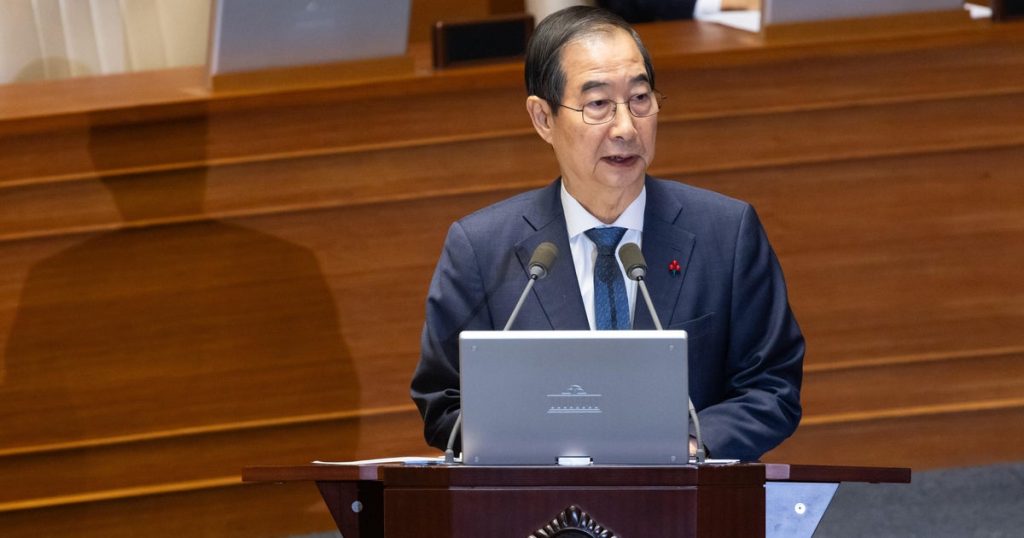On Monday, South Korea’s Constitutional Court reinstated Prime Minister Han Duck-soo by overturning his impeachment, while the fate of President Yoon Suk Yeol remains unresolved. This decision marks a significant development amidst a political landscape fraught with tension and division following the enactment of martial law by Yoon, which has drawn public outrage and led to massive protests. The ruling could potentially embolden Yoon’s supporters as they navigate a politically charged atmosphere, and the implications on future governance and stability in South Korea are yet to unfold.
| Article Subheadings |
|---|
| 1) Background of the Impeachments in South Korea |
| 2) The Court’s Ruling and Its Implications |
| 3) Han Duck-soo’s Response and Future Focus |
| 4) The Continuing Political Crisis Post-Impeachment |
| 5) Public Sentiment and Future Considerations |
Background of the Impeachments in South Korea
The political turmoil in South Korea began when President Yoon Suk Yeol was impeached by the National Assembly over his controversial decision to impose martial law on December 3. This drastic measure sparked outrage among the opposition and large segments of the public, leading to an unprecedented political crisis. Following Yoon’s impeachment, Han Duck-soo, who was the Prime Minister at that time, was propelled to acting president but soon faced his own impeachment, illustrating the extraordinary level of division among South Korea’s political elite. This sequence of events has not only destabilized the government but has also raised questions about the political future of both leaders.
The Court’s Ruling and Its Implications
On Monday, the Constitutional Court revealed its decision regarding Han Duck-soo‘s impeachment, ruling in favor of the Prime Minister. Out of the eight justices, seven found that the grounds for impeachment were either insufficient or improper, effectively reinstating Han as acting president. The court determined that not only were the allegations against him not legally sound, but there were also procedural deficiencies in the impeachment process, such as a lack of quorum when the motion was passed in the assembly. This ruling, however, does not extend its influence to the separate impeachment trial of President Yoon, leaving many observers to speculate about future rulings.
Han Duck-soo’s Response and Future Focus
Upon his reinstatement, Han Duck-soo expressed determination to prioritize crucial national matters. He highlighted the need to navigate a rapidly changing global trade landscape, particularly in the context of aggressive policies from international actors, such as the Trump administration in the U.S. Beyond addressing economic challenges, Han emphasized the importance of national unity, urging citizens to focus on progress rather than political divisions. His call for reconciliation resonates amid ongoing societal fractures that have intensified since martial law was enacted.
The Continuing Political Crisis Post-Impeachment
Despite the ruling in favor of Han, the political crisis continues to loom large over South Korean society. The Constitutional Court has yet to reach a verdict regarding Yoon Suk Yeol‘s impeachment, creating uncertainty about the future governance of South Korea. If Yoon’s impeachment is upheld, a new presidential election would be mandated; conversely, a ruling in his favor would restore him to full presidential authority. The observations into Yoon’s actions during the martial law declaration—specifically the deployment of military and police forces to the assembly—remain contentious and have fueled public dissent.
Public Sentiment and Future Considerations
The relationship between public opinion and political action in South Korea remains volatile. While initial reactions to Yoon’s imposition of martial law and subsequent impeachments showed widespread disapproval, recent polls indicate a growing base of support among those who identify with Yoon’s party. Mass protests and counter-protests have filled the streets of major cities, as supporters and detractors of the government vie for visibility and influence. As the court deliberates on Yoon’s impeachment, the outcome may pivot on the sustained fluctuations in public sentiment, ultimately shaping the political landscape of the nation.
| No. | Key Points |
|---|---|
| 1 | The Constitutional Court overturned the impeachment of Prime Minister Han Duck-soo. |
| 2 | Seven out of eight justices ruled that Han’s impeachment was improperly handled, lacking substantial legal grounds. |
| 3 | Han emphasized national unity and urgent economic matters upon his reinstatement. |
| 4 | The political climate remains risky, with the fate of President Yoon Suk Yeol still undecided. |
| 5 | Public sentiment regarding Yoon is shifting, indicating potential implications for political stability moving forward. |
Summary
The recent ruling by the Constitutional Court to reinstate Prime Minister Han Duck-soo highlights the tumultuous state of South Korean politics amidst ongoing impeachment proceedings for President Yoon Suk Yeol. As the country grapples with deep political divides and public outcry surrounding the enactment of martial law, the court’s decision could significantly influence the trajectory of governance and the political landscape. With unresolved tensions and changing public sentiment, the coming weeks will be pivotal for South Korea’s political future.
Frequently Asked Questions
Question: What was the reason behind Han Duck-soo’s impeachment?
Han Duck-soo’s impeachment was primarily related to political strife with opposition lawmakers and his refusal to fill vacancies on the Constitutional Court bench, raising concerns about judicial balance.
Question: What might happen if Yoon Suk Yeol’s impeachment is upheld?
If Yoon’s impeachment is upheld, South Korea would need to conduct a presidential election to replace him, further intensifying political instability in the country.
Question: How has public sentiment shifted regarding Yoon Suk Yeol’s leadership?
Initial public sentiment was largely critical of Yoon’s martial law enactment, but recent polls suggest increasing support from his base, indicating a complex and evolving political landscape.


